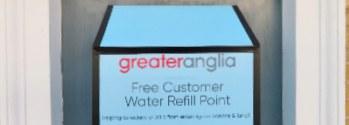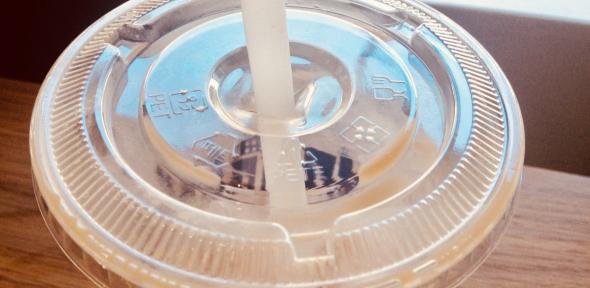
What can consumers do to keep plastic out of the environment?
The following information is based on research with the Cambridgeshire and Peterborough Waste Partnership (RECAP). Despite ongoing campaigns, there are myths about recycling and what happens to plastics locally. Although members of the public think they are doing the right thing, they unintentionally cause problems. The following summary is about what consumers can do and clarifies how recycling works in Cambridge.
1. Put plastic in the bin
Some consumers put rubbish in all sorts of places: On window sills opposite bins; on top of the bin; in a bag next to the bin. The best way to make sure plastic does not end up in hedges and rivers is to make sure it goes inside the bin until it is collected.
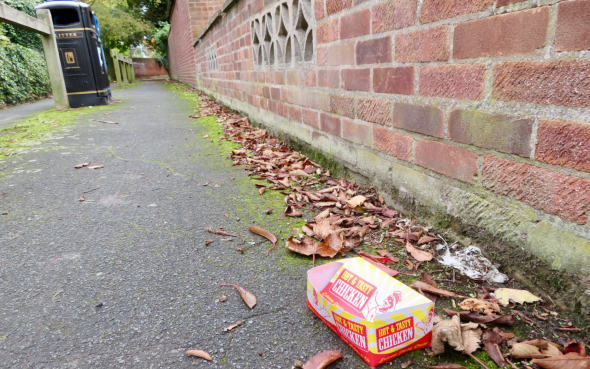
So close, yet so far
What if bins are full?
Since the pandemic, there has been an increase in packaging, but not an increase in the number of bins or collections. Although it is important to be hygienic, if the bin is full, please take the rubbish home or hold on to it until you get to a public bin that is not full. Stuffing rubbish into a full bin means it is more likely to be blown out and pollute the environment.
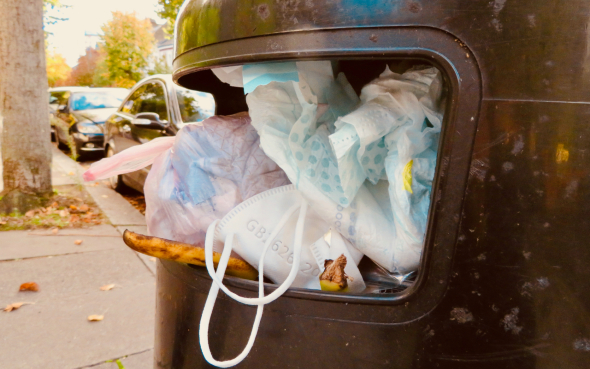
Stop stuffing waste into public bins that are full.
2. Put hygiene products in the black bin
Hygiene products are things like nappies, sanitary products (tampons), masks and gloves. Although they have a plastic component to them, they are not recyclable. In the case of PPE for covid-19 protection, these items should be double bagged and placed in the black bin. This helps to protect the health of key workers such as refuse collectors, from handling hazardous items.
But doesn’t all the plastic get sorted and washed by machines?
Levels of contamination are assessed when recyclable materials are dropped off by the truck after being collected from homes. If recyclable materials are mixed with clothes, they are contaminated. If recyclable materials are dirty, they are contaminated. If recyclable materials are mixed with non-recyclable plastic, they are contaminated. If levels of contamination are too high, the whole truckload has to be taken to landfill instead of recycled.
Last year, textiles and food were the items most frequently responsible for contaminating recyclable materials. Workers spend hours dealing with problems caused by fabric when it is mixed with recycling. Machinery is not designed to sift plastic and non-plastic parts of items, such as shoes.
3. Take reusable items to a charity shop
Charity shops and car boot sales have been restricted due to rules related to covid-19. It is tempting to put things that you think might be useful to someone else outside. When items are not collected by passersby, it is the same as dumping. If you do not have a need for things anymore, it might mean other people do not want them either - even if they are free. It is better to pass on items, such as warm winter clothes, to local organisations rather than leaving them outside in wet weather. Dumped items are more costly for the council to clear up than if they were put in the bin.
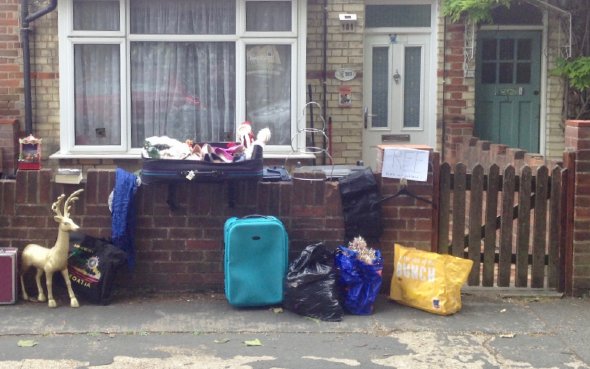
Sign reads ‘FREE Please help yourself!’
4. Read the label
A lot of plastic packaging is not yet recyclable. If you are not sure, you can check the label. If it says ‘not widely recycled’ this means it should not go in the recycling bin. If it does not have a symbol, do not put it in the recycling bin. Putting things that you think should or might be recyclable in the recycling bin is called ‘wishcycling’ - you wish it was recyclable, but you don’t know if it is or not. By putting films and other crinkly packaging in with recyclable materials, you are contaminating the whole bin.
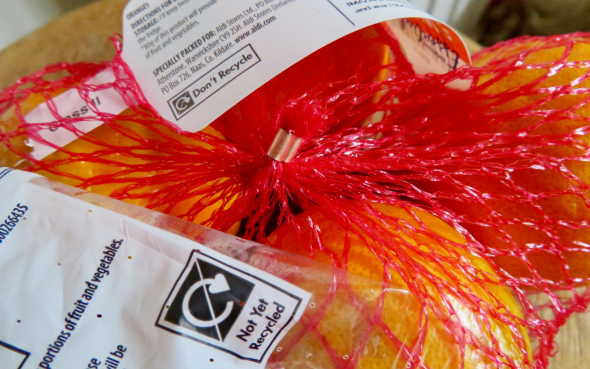
Labelling is designed to make it easier to know what is not recyclable.
But it all gets shipped abroad anyhow, doesn’t it?
All the recycling collected by the Cambridgeshire and Peterborough Waste Partnership (RECAP) is processed in the UK. It is not shipped abroad. The sale of recyclable materials is monitored and reported on. If recycling targets are not met, the council has to pay a fine. There is a problem with waste being sent to other countries from the UK as a whole, but this is not the case in Cambridge.
5. Put compostable plastic in the black bin
Bio plastics are being developed which in future might be better for the environment. But at the moment, the Cambridgeshire and Peterborough Waste Partnership (RECAP) do not have the machinery to process these new types of plastic. They are not recyclable and should not go in the recycling bin.
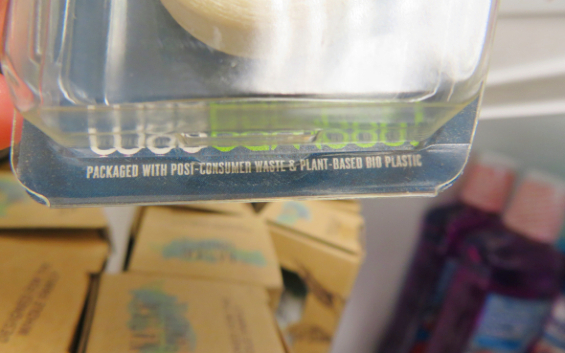
Bio-plastic is not recyclable in Cambridge.
But surely compostable means it is biodegradable?
Research is still being done into what compostable plastic and biodegradable plastic means. Although the wording sounds like it is environmentally friendly, how these plastic alternatives react in UK weather is not known. There is no evidence that compostable or bio-degradable bags are less polluting than their plastic counterparts. At the moment, in Cambridge, it is better to buy plastic that is recyclable and put it in the recycling bin. Non-Recyclable plastic bags are best to be avoided or re-used.
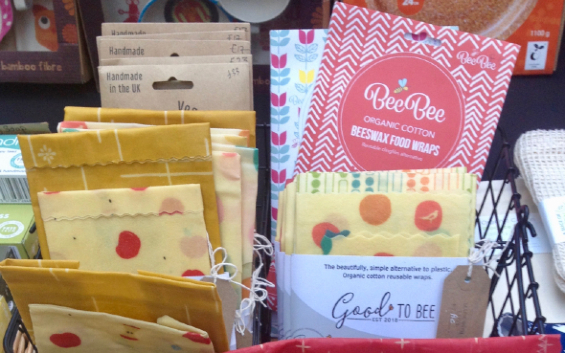
Consumers do not have to buy plastic alternatives.
Can I take part in plastics research?
Yes! Our colleagues at University College London are conducting experiments to find out more about compostable and bio-degradable plastics. It’s called the Big Compost Experiment. You can take part here.
Maybe all plastics are bad?
There are different opinions on this. Some groups are campaigning to make the world plastic free. Others are campaigning to use plastic more wisely as part of a circular economy. The problem of conflicting and different advice for consumers is a known problem. There are plans to simplify rules and ban items that should not be made from plastic (straws, stirrers and ear buds). Researchers realise that change is not all on the shoulders of consumers. Businesses and government have their part to play too.
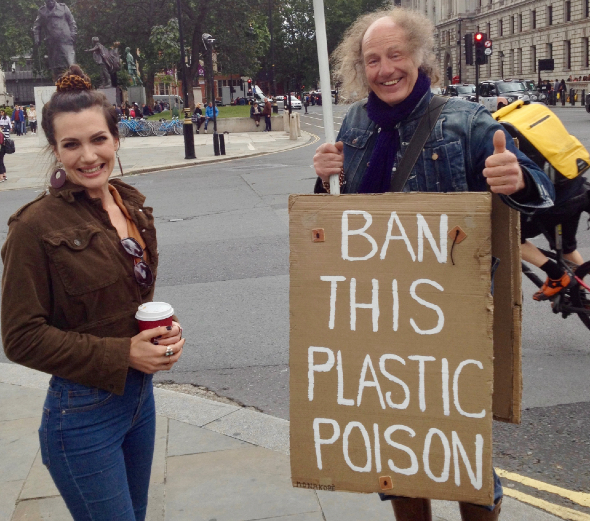
A protester in Parliament Square speaking to consumers about why all plastics should be banned (14 June 2019).
Why is recycling so confusing?
Researchers are consumers too. They often specialise in understanding more about one aspect of plastics, such as polymer science. But when faced with a recyclable bottle, even people with a background in science are not sure if the lid should stay on or off. While in her kitchen, Sally Beken spoke to Anne Hitch to dispel myths about household plastics.
Still interested?
Find out more about our plastics research here.
Find out more about recycling in other countries here.
Find out about the latest plastics news here.




